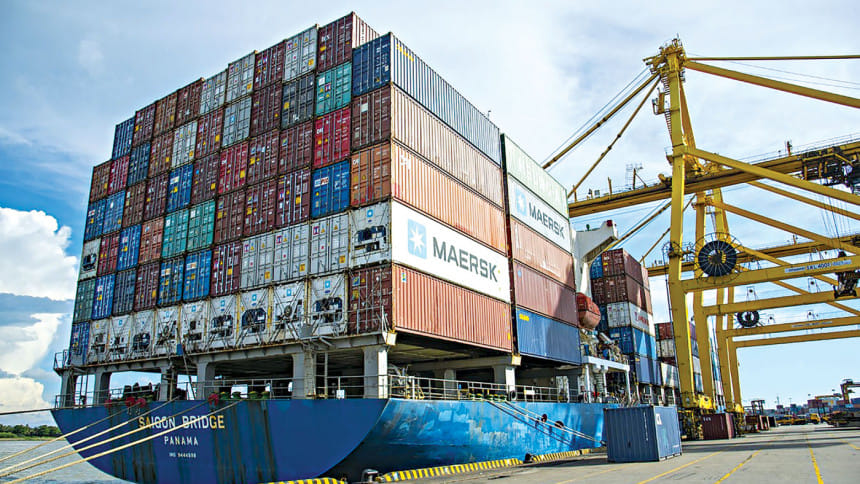Bangladesh’s export-GDP ratio lowest among LDCs

When it comes to the percentage of goods and commercial services exports in gross domestic product (GDP), Bangladesh has had some of the lowest figures among 46 least developed countries (LDCs) over the years.
It was 12.5 percent in 2022, a 2.3 percentage points decline over the span of 12 years, according to World Trade Statistical Review 2023.
GDP is the monetary value of all finished goods and services made within a country during a specific period.
Though the share of commercial services exports in GDP rose to 1.2 percent from 0.9 percent, the share of goods exports fell to 11.3 percent from 13.9 percent.
Among the LDCs, Bangladesh ranks 30th, gaining just one step from that in 2010.
Djibouti tops the list with 142.3 percent followed by Cambodia, Lao People's Democratic Republic, Mozambique, Zambia and Guinea. Those with the lowest shares include Timor-Leste, Tuvalu, Burundi, Yemen, Haiti and Nepal.
Analysts blame a lack of diversification of export products alongside destinations for the low ratio.
Mentionable, Bangladesh is scheduled to make the United Nations status graduation from a least developed to a developing nation in 2026.
"It is not a good sign for the economy," said Prof Mustafizur Rahman, a distinguished fellow at the Centre for Policy Dialogue.
It is true that Bangladesh's global trade has increased, he said.
"But the country's exports didn't increase at the pace of the country's GDP's growth rate. So, the ratio of export to GDP has declined," he said.
"Trade is important for economic growth," said Zahid Hussian, a former lead economist at the World Bank's Dhaka office.
The export basket is also tiny as garments account for 85 percent of the overall export earnings, he said.
But policies that make local sales more profitable than export, structural impediments and compliance issues regarding export of agricultural produce are major barriers to increasing exports, he added.
"And this is not a new issue. We are talking about this a lot. But actions are moving at a snail's pace," said Hussian.
"Bangladesh's domestic market is limited and it is not as big as the economies such as India. So, reliance on only the domestic market will not help the nation achieve its aspiration of economic development," he said.
"The country's export growth has been decreasing over the years, which is not congenial to our economy," said Selim Raihan, a professor of economics at the University of Dhaka.
"The export sector has immense importance when it comes to tackling upcoming challenges for LDC graduation…(the drop in ratio) is a concern for us on whether we are on the right track for graduation," he said.
Echoing the others, Masrur Reaz, chairman of the Policy Exchange of Bangladesh, said the overall increase in export volume was encouraging.
"But the decreasing ratio indicates that our export growth is gradually falling behind our economy's expansion," he said.
This indicates a decreased role of export in the economy and that the level of international openness and globalisation is decreasing, he said.
"This would be of great concern as exports helped Bangladesh reap the benefits of global markets, create quality jobs and income and boost macroeconomic stability by strengthening balance of payments," said Reaz.
"In the coming years, we will need to have this rebound as the economic growth, jobs and income required to graduate to upper middle income will certainly require Bangladesh to exploit the power of international markets," he added.
Due to the low ratio, Bangladesh recently witnessed fluctuations in its foreign currency reserves and currency devaluations, prompting the country to seek a loan of International Monetary Fund, he said.
The lack of diversification in case of both export products and their destinations was the main reason for this situation. Still, dependency on garments has been increasing over the last decade, he said.
Bangladesh has some of the highest potentials for increasing its export-GDP ratio among the LDC countries given the size of its economy, he opined.
Bangladesh needs to focus on increasing competitiveness and go beyond the garment sectors, especially in IT, with proper planning, he said.

 For all latest news, follow The Daily Star's Google News channel.
For all latest news, follow The Daily Star's Google News channel. 



Comments